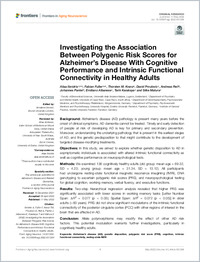Investigating the association between polygenic risk scores for Alzheimer’s Disease with cognitive performance and intrinsic functional connectivity in healthy adults
- Ibnidris, Aliaa ORCID Faculty of Biomedical Sciences, Università della Svizzera italiana, Switzerland - Department of Psychiatry and Mental Health, University of Cape Town, South Africa
- Fußer, Fabian Department of Gerontopsychiatry, Psychosomatic Medicine, and Psychotherapy, Pfalzklinikum, Klingenmünster, Germany - Department of Psychiatry, Psychosomatic Medicine and Psychotherapy, University Hospital, Goethe University Frankfurt, Germany
- Kranz, Thorsten Manfred Department of Psychiatry, Psychosomatic Medicine and Psychotherapy, University Hospital, Goethe University Frankfurt, Germany
- Prvulovic, David Department of Psychiatry, Psychosomatic Medicine and Psychotherapy, University Hospital, Goethe University Frankfurt, Germany
- Reif, Andreas Department of Psychiatry, Psychosomatic Medicine and Psychotherapy, University Hospital, Goethe University Frankfurt, Germany
- Pantel, Johannes Institute of General Practice, Goethe University Frankfurt, Germany
- Albanese, Emiliano ORCID Faculty of Biomedical Sciences, Università della Svizzera italiana, Switzerland
- Karakaya, Tarik Department of Psychiatry, Psychosomatic Medicine and Psychotherapy, University Hospital, Goethe University Frankfurt, Germany
- Matura, Silke Department of Psychiatry, Psychosomatic Medicine and Psychotherapy, University Hospital, Goethe University Frankfurt, Germany
- 2022
Published in:
- Frontiers in aging neuroscience. - 2022, vol. 14
Alzheimer’s disease (AD)
Genetic disposition
Polygenic risk score (PRS)
Cognition
Intrinsic functional connectivity
Resting-state fMRI
English
Background: Alzheimer’s disease (AD) pathology is present many years before the onset of clinical symptoms. AD dementia cannot be treated. Timely and early detection of people at risk of developing AD is key for primary and secondary prevention. Moreover, understanding the underlying pathology that is present in the earliest stages of AD, and the genetic predisposition to that might contribute to the development of targeted disease-modifying treatments. Objectives: In this study, we aimed to explore whether genetic disposition to AD in asymptomatic individuals is associated with altered intrinsic functional connectivity as well as cognitive performance on neuropsychological tests. Methods: We examined 136 cognitively healthy adults (old group: mean age = 69.32, SD = 4.23; young group: mean age = 31.34, SD = 13.12). All participants had undergone resting-state functional magnetic resonance imagining (fMRI), DNA genotyping to ascertain polygenic risk scores (PRS), and neuropsychological testing for global cognition, working memory, verbal fluency, and executive functions. Results: Two-step hierarchical regression analysis revealed that higher PRS was significantly associated with lower scores in working memory tasks [Letter Number Span: ΔR2 = 0.077 (p < 0.05); Spatial Span: ΔR2 = 0.072 (p < 0.05)] in older adults (>60 years). PRS did not show significant modulations of the intrinsic functional connectivity of the posterior cingulate cortex (PCC) with other regions of interest in the brain that are affected in AD. Conclusion: Allele polymorphisms may modify the effect of other AD risk factors. This potential modulation warrants further investigations, particularly in cognitively healthy adults.
- Collections
- Language
-
- English
- Classification
- Medicine
- License
- Open access status
- gold
- Identifiers
-
- DOI 10.3389/fnagi.2022.837284
- ARK ark:/12658/srd1331338
- Persistent URL
- https://n2t.net/ark:/12658/srd1331338
Statistics
Document views: 40
File downloads:
- Ibnidris_2022_Frontiers_Aging Neuro_Investigating the Association: 29
